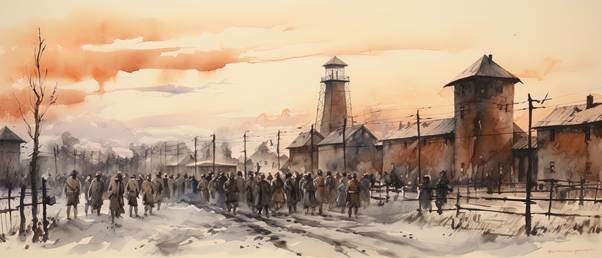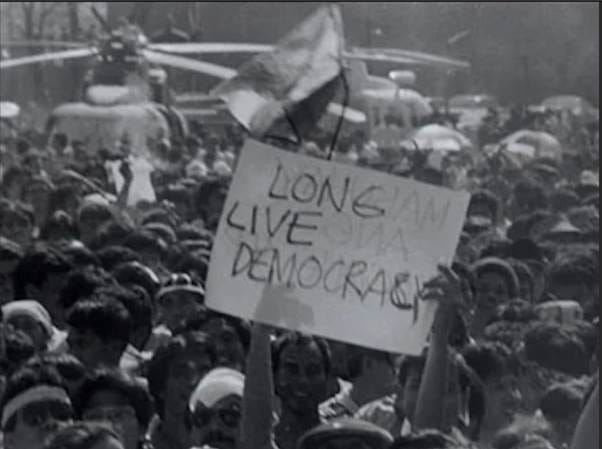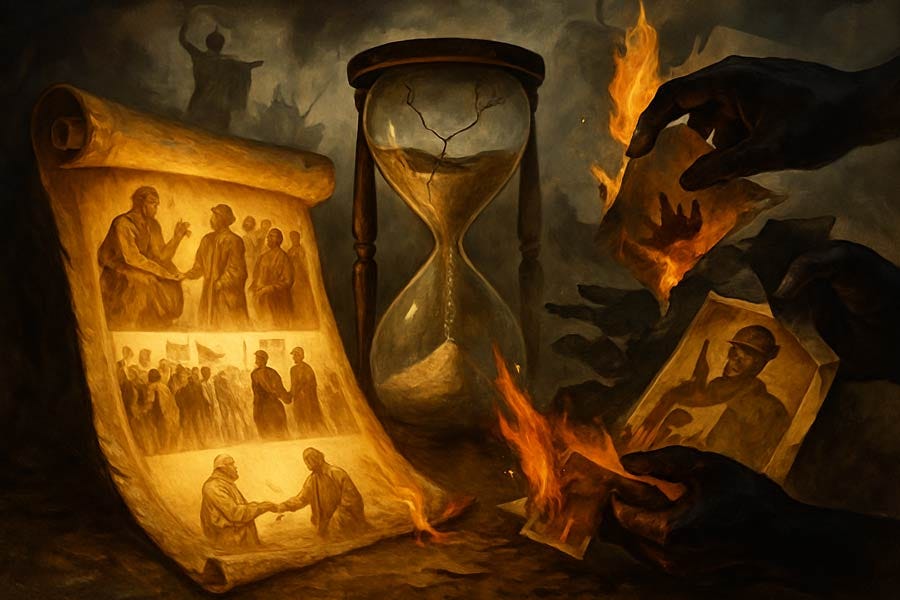"Those who cannot remember the past are condemned to repeat it."
George Santayana
This astute observation from philosopher George Santayana encapsulates the significance of learning from history as a necessary societal imperative, isn’t it?
History has been a treasure trove of human successes and failures and lessons learned from them (or not); a window into how the prose and contours of the present and future can be navigated. This greatest of assets though is often undermined by ignorance or conscious manipulation as societies re-enact disastrous failures.
In this piece I attempt to discuss the absolute need to learn from history, the common problem of historical revisionism and our duty to preserve historical truth in order to create a more empathetic world, to avoid mistakes and bring about a more humane world.
The Vital Role of Historical Knowledge
History is a chart of human experience from which we can learn how our world began and what may lie ahead. I never realize that when I was young, which is why I didn’t enjoy history early on.
It was only as an adult that I truly realized that through the study of what has happened in the past, we can find causes and patterns that have led to important consequences in history, such as wars and revolutions, booms and busts in the economy. As an example, reading about the diplomatic failures and economic strain that led up to World War II can teach us ways to avoid such conflicts today. Reading about the causes of the Great Depression can teach policymakers how to create stable economic systems.
Apart from pragmatic purposes, history contextualizes societal arrangements, cultural morals, and political philosophies. It explains issues such as: Why do disparities remain? How did democracy develop? This is how we nurture a richer understanding of our globalized world and the drivers of change.
But when history is lost or manipulated, societies also shed this sense of purpose and end up repeating the same mistakes with catastrophic results.
The repetition of ethnic wars, economic failure, and authoritarianism in different corners of the globe highlights the price of forgetting.
The question remains, do we learn as much as we ought?
Historical Revisionism: A Tool of Power

Historic revisionism, or the re-interpretation of history, is a double-edged sword. As a valid process, it is a pillar of historiography since it enables scholars to develop a clearer picture of the past from new evidence or viewpoints. For example, the discovery of the Dead Sea Scrolls transformed our understanding of ancient Mediterranean cultures and early Christianity. These revisions add to the accuracy and richness of historical narratives.
However, revisionism also poses a problem when applied to manipulate or deny facts for political and ideological reasons, a phenomenon referred to as historical negationism. Revisionism is usually used by winners, regimes, or hegemonies to wipe out inconvenient truths, whitewash their records, or quell dissidences.
Through the manipulation of history and the maintenance of control over historical narratives, the powerful can forge national identity, legitimize themselves in power, and muzzle opposition. The aphorism “history is written by the winners” captures this phenomenon by describing how history is framed for the benefit of the mighty.
And in our example of the dead Sea Scrolls, why were they hidden in the first place?
Case Studies in Historical Manipulation

To illustrate the dangers of historical revisionism, consider the following relatively recent examples where regimes and powers manipulated history to consolidate control.
Soviet Union Under Stalin
During the Soviet Union, Joseph Stalin's regime closely regulated historical accounts to mythologize the state and eliminate inconvenient facts.
Historians had to make their work conform to the ideology of the Communist Party by invoking Stalin and even Marxist/Leninist works if relevant. Events such as the Holodomor, a man-made famine that resulted in the deaths of millions in Ukraine, were minimized or denied, while Stalin's purges were justified as being for national defence. The Russian Revolution was reshaped in history to enhance Stalin's involvement at the expense of characters such as Leon Trotsky.
This manipulation guaranteed that the Soviet population was fed a sanitized account of history in an effort to prop up the regime and quell dissension.
Nazi Germany
Nazi Germany presents a stark historical revisionism example. The government propagated a skewed Aryan supremacy narrative and manipulated historical facts in an effort to justify aggressive policies of expansion and the oppression and killing of Jews and other minorities.
Through control of the media, education system, and cultural institutions, the Nazis generated a perception in the public in accordance with their ideology.
The revisionism was used not only to enable the Holocaust but also to cover up the contributions and histories of the targeted groups as a testament to how history can be used to dehumanize and oppress.
Colonial Powers
Colonial rulers had a tendency to redefine the histories of the colonized territories in an effort to legitimize colonial rule. To illustrate, European colonizers depicted native peoples as “savages” in need of civilization without considering their histories and cultures. The history of Christopher Columbus “discovering” America serves as a prime example of this because his account marginalized the presence and contributions of native peoples. Colonial histories in British colonies such as India and Africa highlighted the supposed advantages of imperial dominance - such as the rise of infrastructure - while downplaying exploitation, brutality, and cultural erasure.
These manipulated narratives helped to justify colonial hegemony and influenced attitudes in the colonies as well as in the metropole.
The Power of Confronting Historical Truth

Unlike these examples of manipulation, other societies have come to terms with painful histories and achieved change – at least for now! These instances clearly illustrate how facing historical reality can result in ‘healing’, development, and a deterrence of future atrocities.
Germany’s Reckoning with the Holocaust
Germany's handling of its Nazi legacy serves as a prime example of historical accountability. The Federal Republic of Germany took extensive steps after World War II to recognize and make amends for the Holocaust. High school curriculums include education regarding the Nazi regime and trips to concentration camps like Auschwitz. Memorials and museums like the Yad Vashem Holocaust memorial also provide a reminder of the atrocities. Holocaust denial legislation adds strength to this sense of commitment to truth. Germany's confronting of history has encouraged a culture of memory and responsibility and minimized the possibility of repeating such atrocities and enhancing feelings of sympathy with the victims of historical atrocities.
But this reckoning comes with controversy too. Critics say Germany's memory culture is inextricably linked with its defence of Israel and taints debates over current affairs such as the ongoing Gaza crisis. Regardless of the controversy, Germany's efforts are a potent model of how facing history can influence a country's political and ethical agenda.
South Africa’s Truth and Reconciliation Commission
South Africa's Truth and Reconciliation Commission (TRC), which was founded in 1996 following the demise of apartheid, presents another interesting example. Commissioned by Nelson Mandela and headed by Desmond Tutu, the TRC was designed to reveal the truth regarding human rights abuses from 1960 to 1994. Victims narrated their stories in open hearings, while perpetrators had the option to apply for amnesty if they openly revealed their atrocities. The TRC granted 849 out of 7,112 applicants a grant of amnesty while favouring truth over retributive justice.
The TRC's labours helped heal the nation by presenting a forum for acknowledgment and forgiveness and enabled South Africa to transition into a democracy. While controversial, some perceived it as focusing on reconciliation rather than justice. The TRC was a milestone in transitional justice as a model for how reconciliation via truth-telling can heal and avoid the repetition of systemic oppression.
Contemporary Relevance of Historical Revisionism

Manipulation of history is not a phenomenon of the past. In contemporary times, history remains a contentious topic. Historiographic debates in the United States regarding how to cover the history of slavery and racism have been contentious. The sharing of these histories has been curtailed in some states in an effort to avoid creating division, while in other places there has been an insistence on a more honest reckoning with the history of slavery. These historiographic debates indicate the continuing effort to determine national identity and historical veracity.
Russia advocates a narrative in which the government played a central part in vanquishing fascism in WW II while downplaying any mention of Soviet war atrocities or the Nazi-Soviet pact of 1939-1941. Legislation against the “rehabilitation of Nazism” has been employed to silence opposing viewpoints, demonstrating how history may be used to shape public discourse.
These recent examples highlight the importance of revisionism in history in moulding societal values and political agendas. They remind us of how the struggle for historical truth cannot cease and must be an ongoing concern.
The Responsibility to Safeguard Historical Truth

Preserving accurate history is a collective responsibility that involves all of us and including educators, and institutions.
We need to question history accounts, verify sources and get different points of view. We do know that mainstream media has always been biased and now more than ever. Thankfully we now have instant access to numerous resources. This questioning protects against taking doctored accounts of history at face value. Critical thinking has to be utilized.
And there's also the increasing concern about AI. Suppose everything goes digital and AI has access to everything. How do we know history won't begin to be changed slowly and methodically?
Teachers have a crucial responsibility in imparting history in a multi-faceted manner with a focus on facts and context. Curriculums must incorporate all facts and perspectives and allow students to think critically regarding history.
Museums, libraries, and archives have the responsibility to conserve historical documents and artifacts so that they can be used for study and learning.
Independent historical study must be funded and shielded from political influence.
Citizens can also support policies upholding historical accuracy by championing fact-based education and opposing censorship of historical debates.
By following these steps, I believe, we can prevent efforts to manipulate history and keep history as a means of learning and development and not manipulation.
Conclusion: A Call to Action
Learning from history is a moral and pragmatic necessity which enables our societies to shun disastrous mistakes, develop (true) compassion, and create a more equitable future. The cases of the Soviet Union, Nazi Germany, and colonial regimes show the risks of historical revisionism where truth takes a backseat to power. Alternately, Germany’s Holocaust education and South Africa’s TRC show the potential of learning from historical truths.
Through an age of contested narratives and information overload, let us be mindful against the manipulation of history.
By upholding true records of the past and being honest with the history of the world in which we live, we respect those who preceded us and prepare ourselves to deal with the challenges of the present. Let us undertake this responsibility by asking ourselves how history can be a beacon of truth and not one of falsehoods? The difference lies in our shared will to study, question and preserve what the past teaches us.



A powerful and timely call to protect history from distortion. Your thoughtful analysis reminds us how truth, compassion, and memory must guide our path forward. So thought provoking.
True all the way!!!